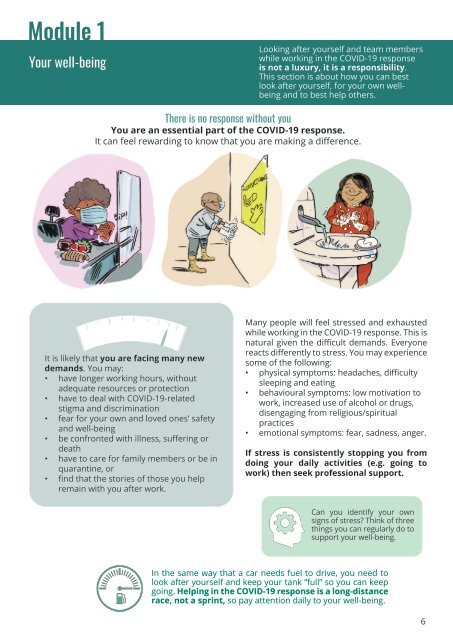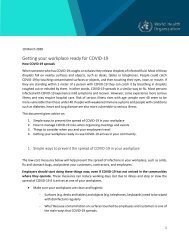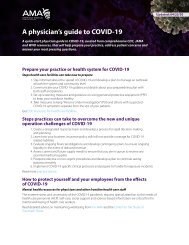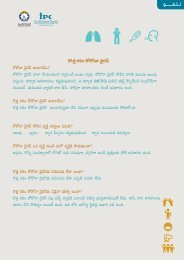WHO - Basic Psychosocial Skills- a guide for covid-19 responders
Basic Psychosocial Skills A Guide for COVID-19 Responders
Basic Psychosocial Skills A Guide for COVID-19 Responders
Create successful ePaper yourself
Turn your PDF publications into a flip-book with our unique Google optimized e-Paper software.
Module 1<br />
Your well-being<br />
Looking after yourself and team members<br />
while working in the COVID-<strong>19</strong> response<br />
is not a luxury, it is a responsibility.<br />
This section is about how you can best<br />
look after yourself, <strong>for</strong> your own wellbeing<br />
and to best help others.<br />
There is no response without you<br />
You are an essential part of the COVID-<strong>19</strong> response.<br />
It can feel rewarding to know that you are making a difference.<br />
It is likely that you are facing many new<br />
demands. You may:<br />
• have longer working hours, without<br />
adequate resources or protection<br />
• have to deal with COVID-<strong>19</strong>-related<br />
stigma and discrimination<br />
• fear <strong>for</strong> your own and loved ones’ safety<br />
and well-being<br />
• be confronted with illness, suffering or<br />
death<br />
• have to care <strong>for</strong> family members or be in<br />
quarantine, or<br />
• find that the stories of those you help<br />
remain with you after work.<br />
Many people will feel stressed and exhausted<br />
while working in the COVID-<strong>19</strong> response. This is<br />
natural given the difficult demands. Everyone<br />
reacts differently to stress. You may experience<br />
some of the following:<br />
• physical symptoms: headaches, difficulty<br />
sleeping and eating<br />
• behavioural symptoms: low motivation to<br />
work, increased use of alcohol or drugs,<br />
disengaging from religious/spiritual<br />
practices<br />
• emotional symptoms: fear, sadness, anger.<br />
If stress is consistently stopping you from<br />
doing your daily activities (e.g. going to<br />
work) then seek professional support.<br />
Can you identify your own<br />
signs of stress? Think of three<br />
things you can regularly do to<br />
support your well-being.<br />
In the same way that a car needs fuel to drive, you need to<br />
look after yourself and keep your tank “full” so you can keep<br />
going. Helping in the COVID-<strong>19</strong> response is a long-distance<br />
race, not a sprint, so pay attention daily to your well-being.<br />
6












